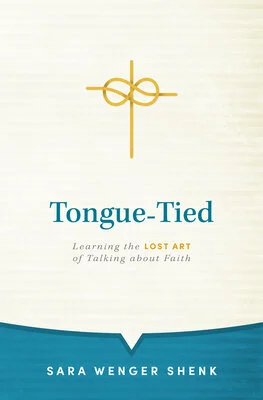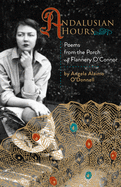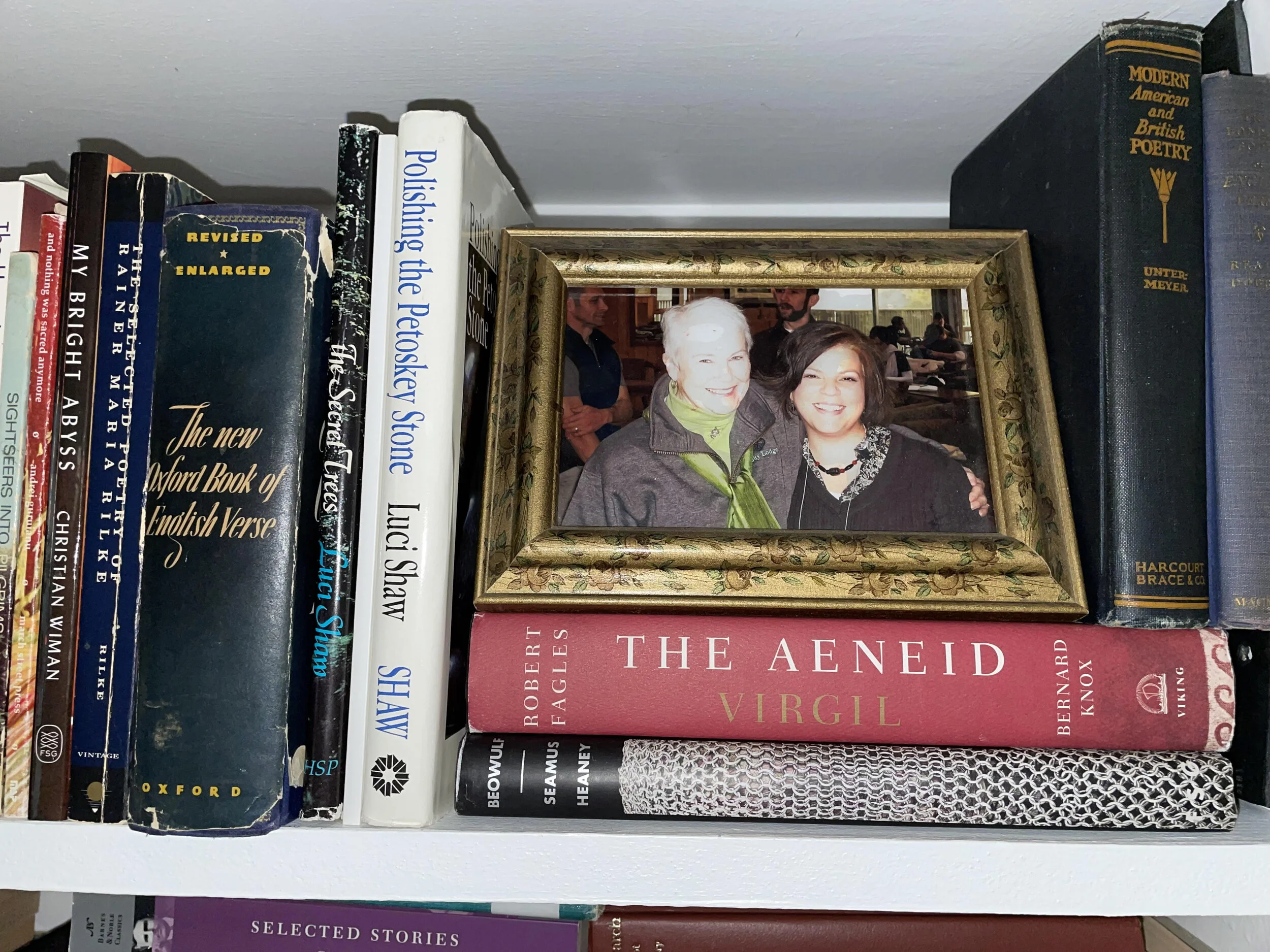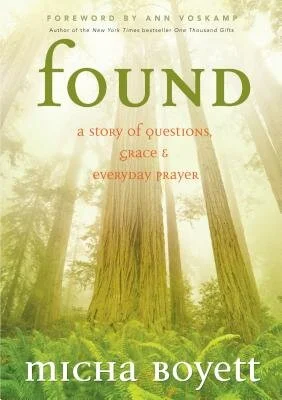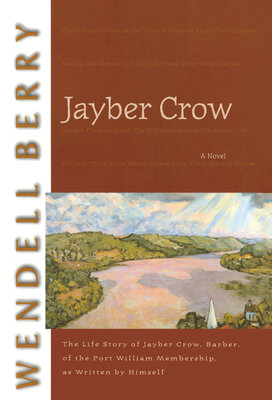Lovers of Gospel Conversations - A Review of Tongue-Tied: Learning the Lost Art of Talking about Faith by Sara Wenger Shenk
Lovers of Gospel Conversations
A Review of
Tongue-Tied: Learning the Lost Art of Talking about Faith
Sara Wenger Shenk
Paperback: Herald Press, 2021
Bookshop | Amazon | Hearts & Minds Booksellers
Reviewed by Tamara Hill Murphy for Englewood Review of Books, September 2021: https://englewoodreview.org/sara-wenger-shenk-tongue-tied-learning-the-lost-art-of-talking-about-faith-review/
Sara Wenger Shenk’s new book enlivened my somewhat-dormant evangelistic impulse. The title, Tongue-Tied: Learning the Lost Art of Talking about Faith, uses all the right words to evoke a meaningful practice in my spiritual background while promising a new and better way to speak the language.
I spent my formative years following my father into our neighbors’ homes offering stories about faith as naturally as the extra produce from our garden. My dad was also my pastor and he had the gift many folks in the church of my childhood said they wanted and most of us in the church of my adulthood have long since forgotten – the ability to talk about Jesus with people who don’t normally talk about Jesus.
You don’t have to be a former preacher’s kid or even consider yourself an evangelical to be drawn to the premise of Tongue-Tied. If you’ve found yourself wondering how to share what’s meaningful to you about your faith with those who don’t share your faith and you feel like your only two options are to sound like a judgemental jerk or to sound more spiritual than Jesus, Shenk’s book offers a third way to speak humanly about the gospel. If you’re expecting the book to offer this guidance as a kind of lexicon of new terms, you might be disappointed by the expository perspective Shenk offers. If you’re drawn to the idea of speaking about faith as recovering a lost artform as the title suggests, you’ll appreciate the time and care the author gives to laying both a groundwork (how we lost our fluency) and a framework (how we can learn fluency).
To be clear, this is not a revised Romans’ Road for a post-evangelical world. You won’t find an outline or recommended script for sharing your faith. You won’t even hear a lot of anecdotes modelling a new way to talk about faith. Instead, Shenk offers a heartfelt rationale born out of her experience growing up in a Mennonite community steeped in a communal language about the Bible and faith, and then graduating into the world of theological academia where, ironically, the communal language gave way to an uneasy acknowledgment of all the ways religion has thwarted human flourishing.
Like Shenk, I’d taken notice of Jonathan Merritt’s book, Learning to Speak God from Scratch: Why Sacred Words Are Vanishing – and How We Can Revive Them. Perhaps my own hubris kept me from trusting Merritt’s capacity to handle the subject with the kind of substance I long for in this conversation. Intrigued to hear the perspective from a denominational background more on the fringe than in the center of the last century’s “evangelical bubble”, I inherently trusted this author more. At the same time I was glad she referenced Merritt’s work on multiple occasions (as she does Englewood Review’s editor Christopher Smith for his 2019 title How the Body of Christ Talks: Recovering the Practice of Conversation in the Church). While I haven’t read Merritt’s book, I imagine Tongue-Tied adds breadth and dimension for all who wish to recover the lost art of gospel witness in the world.
Shenk’s most compelling persuasion to learn the lost art of talking about faith is to constrain us to love. She begins and ends the book reminding us that the “language of faith is giving voice to a story of love”. Substantive, embodied love is the translator Shenk relies on for each chapter of her book.
“Learning to love God is all about learning to trust God… Even if we have faith that ultimately the love of God will win over all that is loveless, inhumane, life-destroying, and fouled up, any honest talk about God will need to contend with betrayal, failure, disappointment, and defeat. Faith, and the language we use to describe faith, will be worth learning only if it is forged in a fire that burns out all that is false and dehumanizing; a fire that requires honest reckoning with suffering, sin, and evil.”
This is the strength of Shenk’s writing – pointing us toward the language of love in all of its gospel-saturated dialects. Love is the translator, and the Spirit of God is the source. Shenk credibility glistens in these passages as she welcomes the spectrum of theological, denominational, institutional, and political talking heads to “articulate a moral vision for God’s just and peaceful shalom in the public spaces, work arenas, and neighborhoods we inhabit.”
In her eloquent and humble argument, Shenk describes again and again what she believes is at stake if we continue to speak in a superficial and contrived code rather than a full-throated language of love.
“And so I come somewhat trembling to this … book project – because what I offer may sound like an unfair critique. I believe, even so, that I, and every one of us, should reflect on the language we reflexively use in order to become more aware of words and phrases that sound out of touch with reality, maybe misunderstood, or worse, maybe dishonest and even harmful.”
In each chapter and subheading she offers what she describes as a “contemplative or prayerful approach” to every facet of existence, vulnerable to the life harm that comes from our euphemism, inaccuracy, disembodied neglect. A prayerful approach opens our imagination to what’s to be gained when we choose to believe that paying attention to “God-talk” is necessary.
To underscore the point, Shenk introduces us to the voices of Christians (most of them current with a few important references to church mothers and fathers) who not only talk about a God who is active and present, but who also walk their talk in the world through word, deed, and Spirit.
Through these examples and many of her own, Shenk urges us to resurrect “skills and acuity for detecting God’s Spirit”.
“Within a flattened world, we give ourselves to activism or business or family life or fantasy without any expectation of divine intervention. We rarely take time to imagine with our children or grandchildren how we might listen for God, respond to God’s call to action, anticipate God’s intervention, or give ourselves in service to the shalom vision of God for the world.”
As a spiritual director trained to hold space for others to notice God’s active presence in their everyday lives, I appreciate Shenk’s repeated exhortation to first listen! Like her other guiding principles, this exclamation weaves its way through the entire book like a rallying cry. Wisely she connects the act of listening to vulnerability, acknowledging that listening involves not only spoken language, but also to the world around us, and, indeed, our own bodies.
Shenk’s emphasis on the power of embodied language sets her work apart from outdated and discarnate ideas of evangelism. With encouragement that Christians become comfortable in their own skin as a requisite for talking about our faith, Shenk offers a counterintuitive and essential point to what it means to bear witness to the incarnate Christ.
I’m grateful to the author for offering her particular experiences with the language of shame and exclusion spoken in the guise of Christian perspectives. Her story carries a certain authority we need to recognize. At the same time, I also wish that she would’ve pressed further in asking how specific issues she repeated (e.g., human sexuality, same-sex marriage) may already have lost their meaning to ideologically coded language like “inclusion”, “affirming”, “welcome,” and “love”. If we could more fully apply Shenk’s commitment to “curiosity and playfulness when it comes to God-talk, a playfulness that knows all about reverence and holy hilarity,” which of these post-evangelical descriptions are just a new faith code that threatens to flatten the immense power of God’s all-consuming love?
As much as I relished Tongue-Tied’s expansive insight, I sometimes found myself frustrated by its structure. In part 1 (Losing Fluency), the author uses five topical subheadings to expose layers of the lost language of faith: Full of ourselves, Out of tune, Disappointed in love, Pulling the world apart, and Silencing stories. In part 2 (Learning Fluency – Step by Step), she offers a rubric of five features of speaking faith fluently: First listen!, Submit to mystery, It’s all about being in love, Hold the world together, and Speak from storied, holy ground. In theory I found the subheadings intriguing but in reading they sometimes felt distracting. Several of the chapters felt interrupted rather than advanced by the repeated rubric.
Along with the subheadings, I also felt interrupted by too many quotations from other thinkers and writers. I’m most surprised by this critique as I consider myself a collector of excerpts and direct quotations. In many places, the book begins to feel more like a curation of supportive statements that distract from, rather than enhance, Shenk’s eloquent, earnest prose.
I’ll leave you with a beautiful example of Shenk’s own words:
“When we dare to learn how to pray and how to talk about the ways in which God has shown up in our lives, there’s a kind of grace that infuses the most ordinary moments of our lives – both personal and familial, and in our circle of friends or church. We don’t get there quickly – without a lot of stumbling, awkward moments, and regrets – but that’s what learning the art of talking about faith requires. Practice. It takes practice to learn how to be genuine and natural; to speak about when we’ve sensed the Spirit’s prompting, or felt convicted of dishonesty, or encouraged to be more courageous, or experienced something that defied explanation – something miraculous. We can learn to be truth-tellers – testifying in honest, authentic ways about what we’ve observed of God’s activity in the mundane and in the more spectacular events of our lives.”
In Tongue-Tied: Learning the Lost Art of Talking about Faith, Sara Weger Shenk offers a winsome invitation to join her as a student of gospel language and as a lover of gospel conversations. I’m grateful for the loving reminder that the word-made-flesh lives and moves and has its being in the storied, holy ground of our lives.
Bonus Feature
Did you know you can find all the book reviews I’ve published here: Book Reviews
